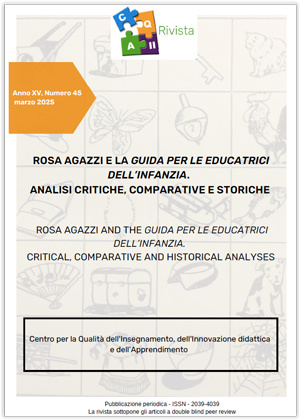Cultural Roots and Historical Context of the «Pasquali-Agazzi» Method
Abstract
This paper explores the origins and evolution of the early childhood education method developed by Pietro Pasquali, along with Rosa and Carolina Agazzi, in Mompiano (Brescia) at the close of the nineteenth century. While numerous studies have examined these three educationalists and their pioneering initiative, certain aspects remain underexplored. This article seeks to address these gaps, focusing on the cultural influences that shaped the method and the historical context that facilitated its nationwide adoption. The first part delves into the ideals and personal relationships that shaped the method until the end of the First World War, as well as its connections to the broader pedagogical movements of the time. The second part examines the relationships forged from the mid-1920s onward with Catholic circles, analysing historiographical interpretations of these interactions and highlighting areas where future research could deepen our understanding of this encounter.









